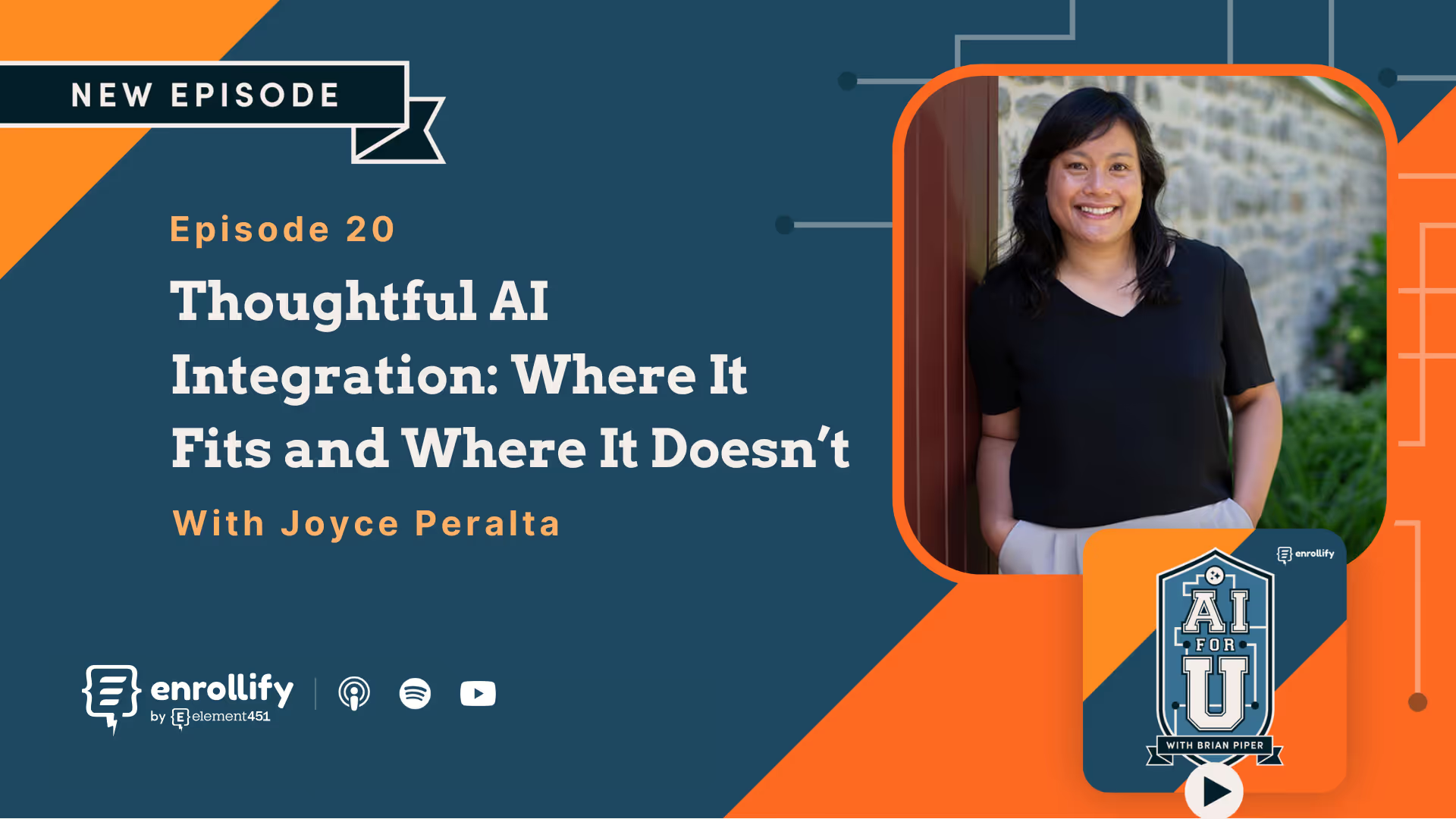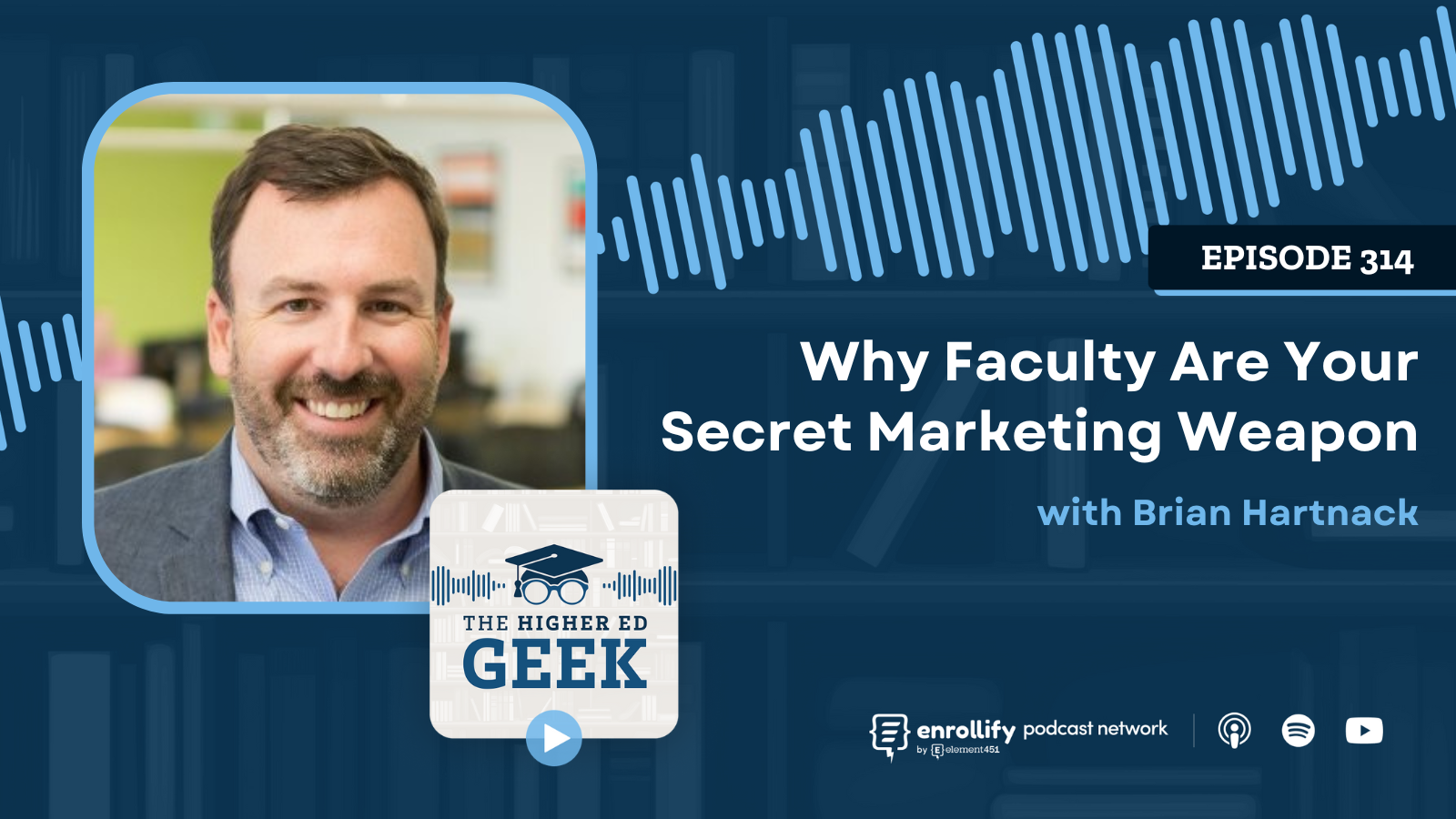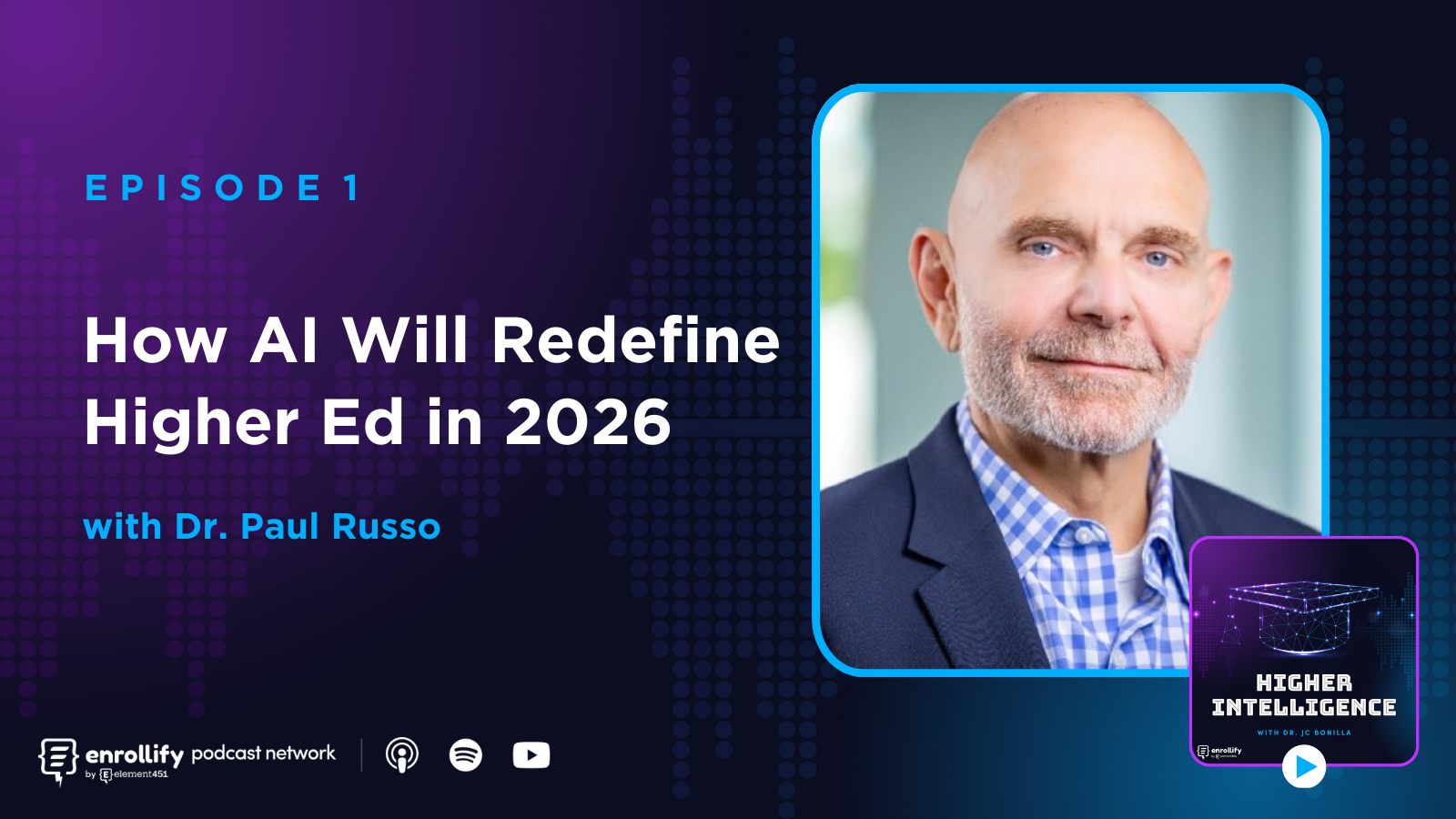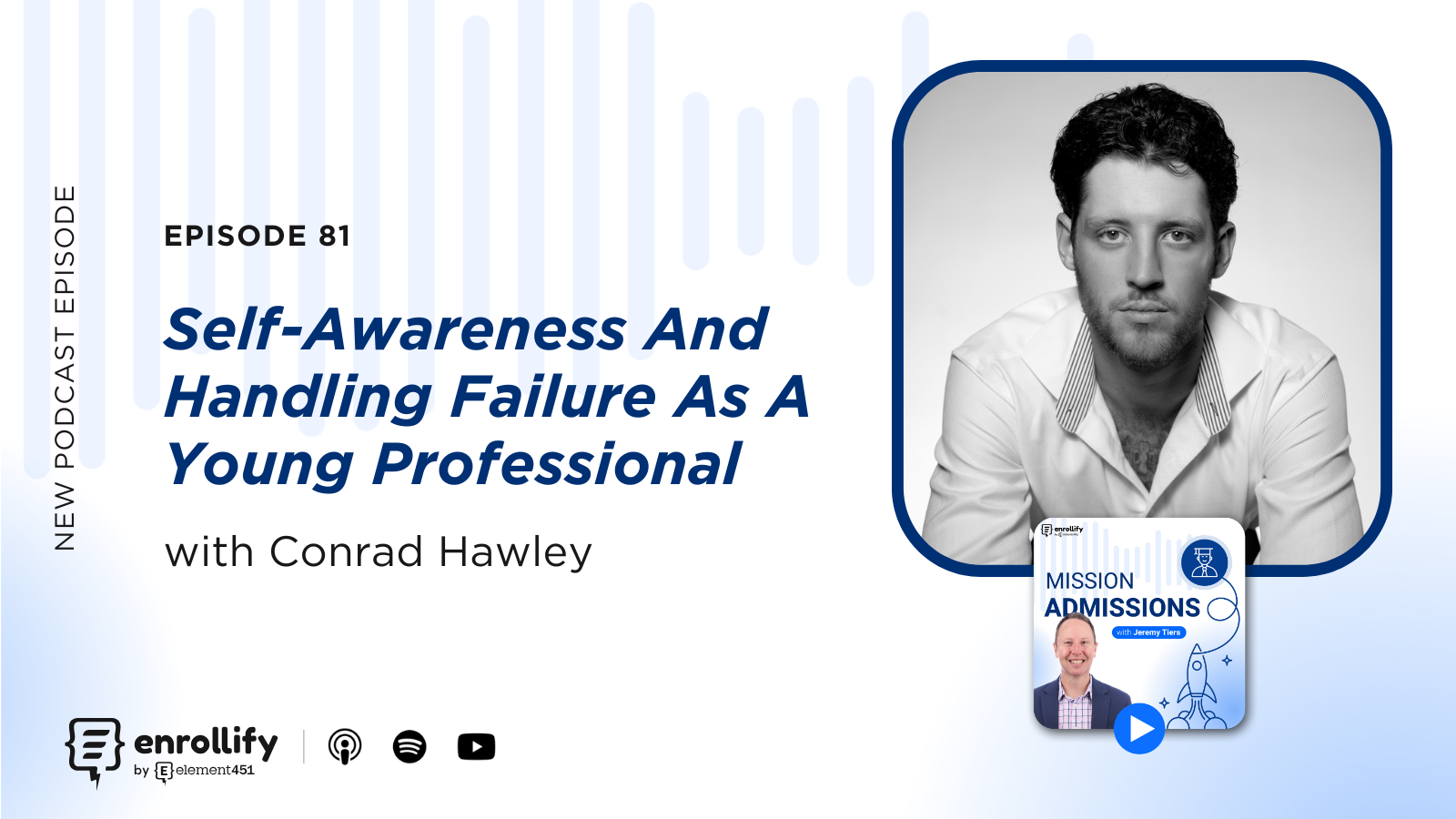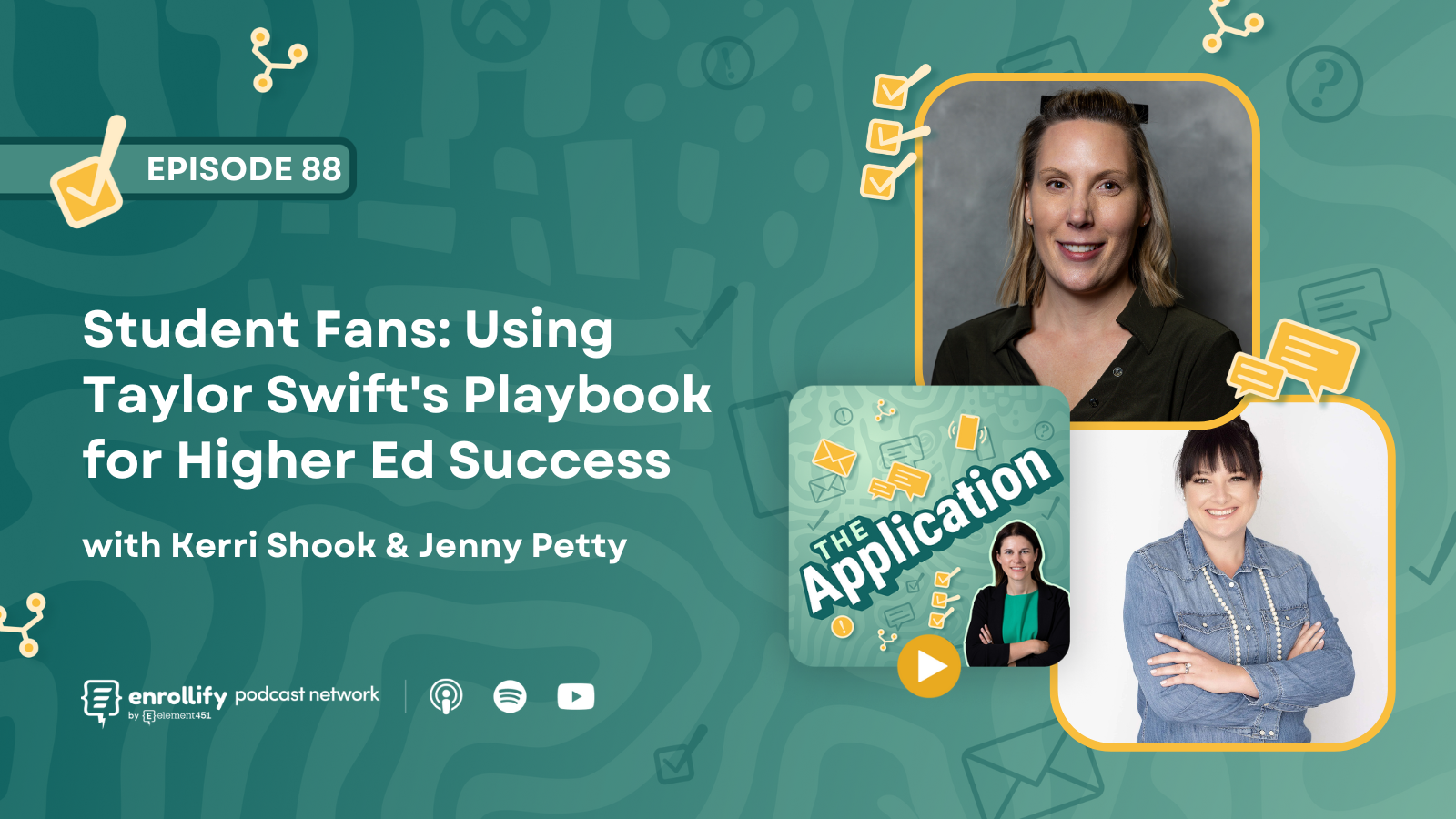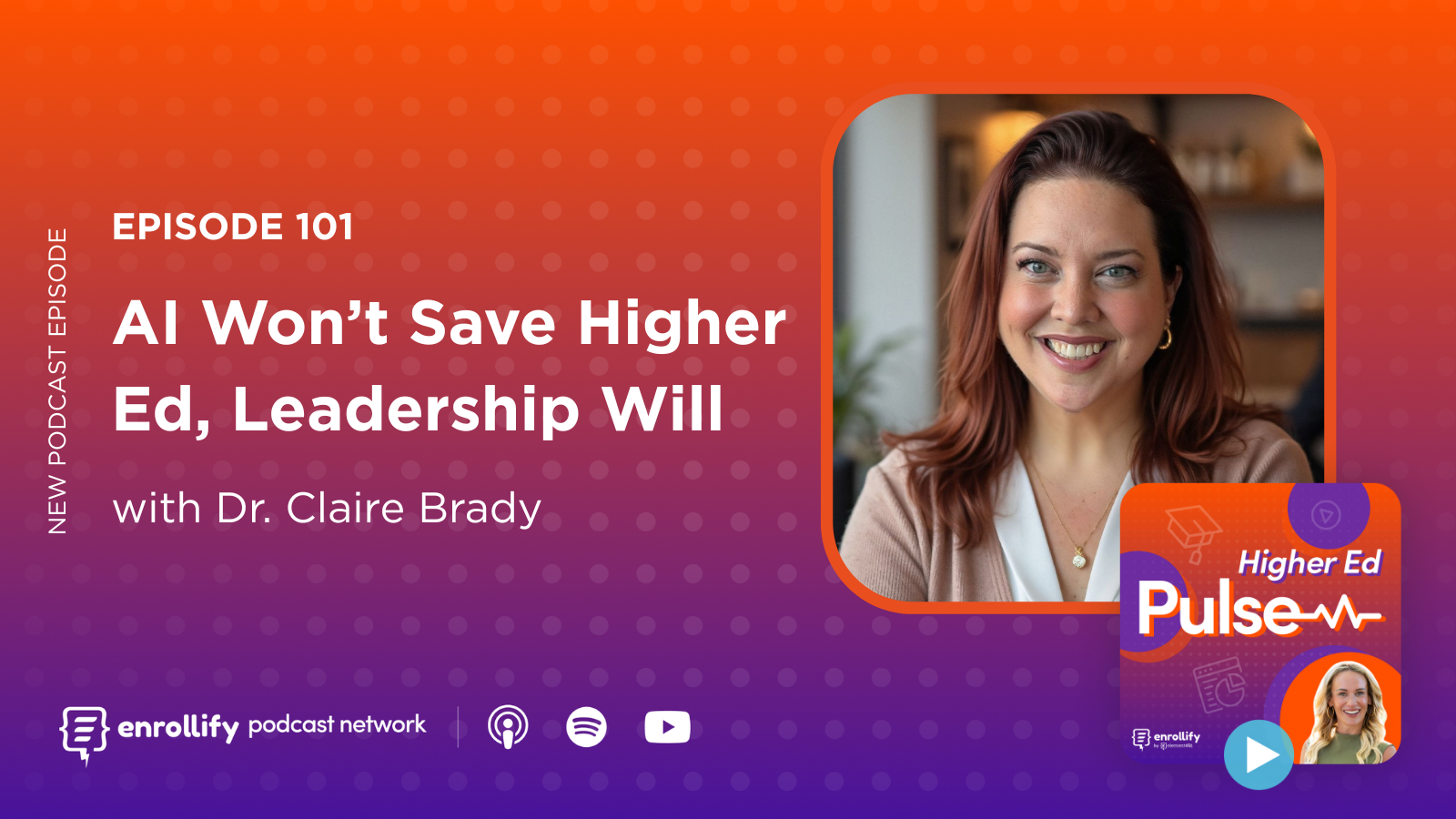About the Episode
Got a story to tell? An innovative idea to share? Fill out our guest nomination form and let's chat!
About The Episode:
In this episode, Brian sits down with Joyce Peralta, Manager of Digital Communications at McGill University in Montreal, to explore the evolving role of AI in higher education. Joyce shares why AI integration is less about technology and more about transformation: one that requires emotional readiness, ethical reflection, and a willingness to experiment. We dive into the challenges of data quality, the importance of governance, and how institutions can foster a culture of learning over perfection in this new AI-enabled era.
Join us as we discuss:
- [8:00] How to combine human and AI analysis for deeper insight
- [13:54] Organizational challenges — silos, coordination, and emotional comfort
- [20:50] How to let AI handle the average so humans can focus on the exceptional
To hear this interview and many more like it, subscribe on Apple Podcasts, Spotify, or our website, or search for AI for U with Brian Piper in your favorite podcast player.
How McGill Is Using AI to Power Digital Student Journey Mapping
McGill University has taken a proactive approach to integrating AI into its digital communication and user research workflows. Joyce Peralta outlines how her team is using generative AI to analyze student experiences by mapping the entire digital journey—from onboarding to graduation. This includes examining not just how students engage with online tools and websites, but also how staff interact behind the scenes to support them.
AI tools help streamline tasks like transcription and translation, allowing Joyce’s team to focus more on extracting meaningful patterns from interview data. For example, by using AI to tag themes based on demographics like age or language spoken, the university gains a more nuanced understanding of its audience. But McGill doesn’t stop there—they double-check AI-generated insights against manual human analysis to ensure accuracy and completeness.
This hybrid approach has given McGill the flexibility to experiment safely. It's not just about automation—it's about using AI to surface richer insights, enable more thoughtful design decisions, and ultimately improve the student experience.
The Role of Clean Data and Ethical Governance in Higher Ed AI
One of the recurring themes throughout Joyce’s insights is the importance of data quality and ethical AI governance. She’s candid about the inconsistencies in historical data collected across higher ed—highlighting that many institutions are trying to make AI magic happen with outdated or poorly structured datasets.
At McGill, AI is only used to analyze freshly collected, interview-based data. Joyce believes that institutions must resist the urge to rush into automation without addressing the foundations. She advocates for better data governance policies, more structured content, and cleaning up existing repositories before AI can be truly transformative.
For institutions just beginning their AI journeys, Joyce recommends building guidelines that emphasize both where AI should be used and where it shouldn’t. That means recognizing AI's limitations, encouraging transparency, and creating safe spaces for experimentation. These foundational efforts will allow higher ed professionals to scale AI usage responsibly.
AI for Inclusion: Accessibility and Multilingual Support at McGill
In one of the most compelling parts of the conversation, Joyce highlights how AI is improving accessibility and inclusion at McGill. From developing customized language boards for individuals with disabilities to offering real-time transcription in multiple languages, AI tools are breaking down communication barriers for students and staff alike.
As a bilingual university situated in a French-speaking province, McGill faces unique challenges in maintaining inclusivity across digital experiences. AI is stepping in to bridge those gaps—facilitating smoother communication, increasing understanding, and enabling broader participation in academic and administrative conversations.
Joyce also points out that AI can make previously inaccessible content usable for wider audiences, including international students and those with non-dominant language preferences. These inclusive applications of AI may be underutilized today, but they hold enormous promise for the future of equitable education.
Balancing AI Efficiency with Human-Centric Work
Throughout the episode, Joyce emphasizes that AI isn’t a replacement—it’s a partner. She encourages professionals to experiment with AI in areas like content formatting, transcript analysis, and repetitive admin work, so they can reclaim time to focus on what humans do best: empathy-driven storytelling, strategic planning, and community building.
A big takeaway is that AI enables people to lean into their expertise. For enrollment marketers and digital teams, this means using generative AI to streamline content while putting more creative energy into strategy and student engagement. Joyce also reminds us that AI’s outputs are statistically average by nature—so the most impactful insights still need a human touch.
And here’s the kicker: Just because AI can do something doesn’t mean it should. Knowing when to hand tasks to AI and when to lean into personal judgment is the real superpower higher ed teams need to cultivate.
FAQs Answered in This Episode
How is McGill University using AI in communications?
McGill is using AI to support translation, content summarization, user journey mapping, and qualitative research analysis—especially in bilingual and accessibility-focused projects.
What role does AI play in student journey mapping?
Generative AI helps identify patterns and extract themes from interviews, giving McGill deeper insights into the digital experiences of students and staff throughout the academic lifecycle.
Why is data governance critical for AI in higher ed?
Joyce highlights that without clean, representative data, AI tools can produce misleading or low-value outputs. Responsible data management and governance are essential for meaningful AI applications.
How does McGill ensure ethical use of AI?
McGill balances manual and AI processes, sets clear guidelines for responsible use, and focuses on use cases that improve inclusivity, efficiency, and strategic decision-making.
What’s the biggest challenge for AI adoption in higher ed?
The biggest hurdles include poor data quality, siloed operations, emotional discomfort among staff, and lack of clear governance frameworks.
What advice does Joyce give for institutions just starting with AI?
Start by identifying low-risk areas where AI can provide value, focus on transparency, and treat AI integration as a learning journey. It’s okay not to have all the answers—experimentation is key.
Episode prompt:
You are an expert in [language] localization for higher education marketing. I'm going to be asking you to translate content from English to [language].
Translate the following [type of copy - landing page copy, social media copy, etc.] for [target audience - prospective students, current faculty, knowledge seekers, etc.] in [target location - country, region, etc.]:
- Use [define the tone - warm, professional, etc.] tone.
- Adapt phrases and idioms to fit [culture or location].
- Ensure culturally appropriate references.
- Optimize for keywords related to [strategic keywords in quotes - "study abroad," "American universities," etc.].
- Output in [target format - text for social post, HTML format for web integration, etc.].
Here is the content:
"""
[copy/paste content here or attach to prompt]
"""
Connect With Our Host:
Brian Piper
https://www.linkedin.com/in/brianwpiper/
About The Enrollify Podcast Network:
AI for U is a part of the Enrollify Podcast Network. If you like this podcast, chances are you’ll like other Enrollify shows too!
Some of our favorites include Generation AI and Mastering the Next.
Enrollify is produced by Element451 — the next-generation AI student engagement platform helping institutions create meaningful and personalized interactions with students. Learn more at element451.com.
Attend the 2025 Engage Summit!
The Engage Summit is the premier conference for forward-thinking leaders and practitioners dedicated to exploring the transformative power of AI in education.
Explore the strategies and tools to step into the next generation of student engagement, supercharged by AI. You'll leave ready to deliver the most personalized digital engagement experience every step of the way.
👉🏻 Register now to secure your spot in Charlotte, NC, on June 24-25, 2025!







